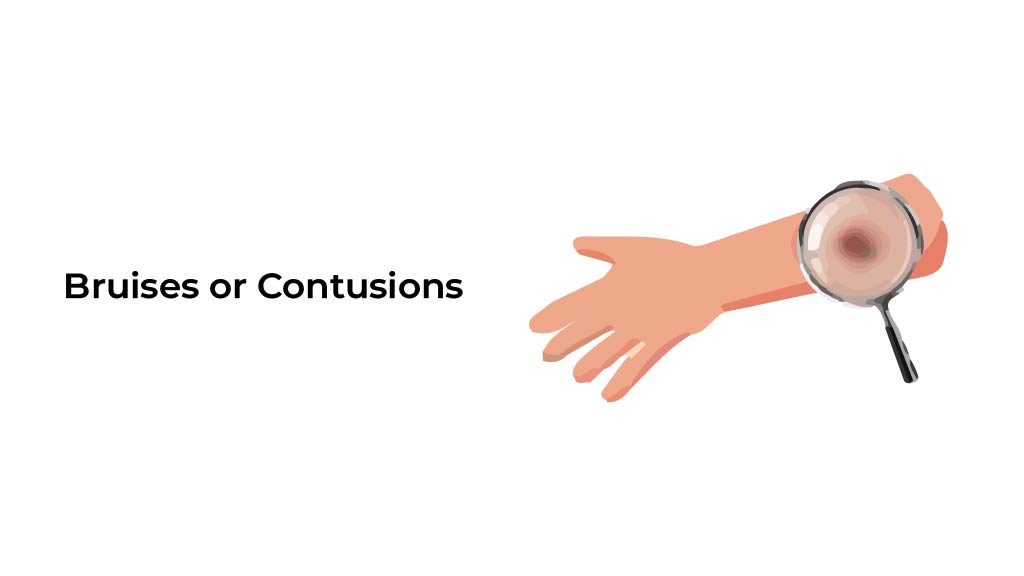
A contusion is a medical word used for bruises, which is a prevalent condition. When you sustain an injury due to any cause, your skin appears to change color and becomes tight, itchy, and painful. Bruising affects not only the skin but also the arteries, muscles, and bones. When you get a bruise, blood vessels in the wounded area become irritated, and blood pools underneath the skin. When the skin heals, it turns reddish, purple, and bluish.
Most bruises do not require treatment; cold and warm therapy can manage the pain and inflammation. However, bruises can be detrimental to one’s health when it affects the bones or muscles. This article comprehensively discusses bruises and contusions in terms of their kinds, causes, symptoms, treatment, and prevention.
Types of Bruises
Bruises are categorized based on damage caused to organs and how. The following are common types of bruises or contusions: Subcutaneous bruises: It is the most common type of bruise, which occurs when a person’s skin gets discolored and sore caused by an injury. Unless the damage is severe and affects muscles or bones, this form of the bruise is usually not an immediate medical concern. It heals on its own after a few days or a week or two, and practically everyone gets bruises at some point in their life.Periosteal bruises:
In this type of bruise, the bones get affected by various factors such as falling from a great height, being involved in a car accident, or being hurt while playing sports. The tissues and blood vessels surrounding the bones are affected by the injury. Blood leakage causes clots around the bone tissues and makes it harder to flow blood. Inflammation and stiffness in the bones are the common symptoms of periosteal contusion. In this case, you should see a doctor to get the diagnosis of the problem and treatment accordingly. Typically, X-rays are used to diagnose bone conditions, but in this case, doctors utilize an MRI scan as an X-ray cannot identify a blood pool on a bone. If the injury is not severe, it will take time to heal. A doctor may also give anti-inflammatory medication to relieve pain and inflammation. However, you can also employ cold and hot therapies at home.Intramuscular bruises
This type of bruise affects muscles and causes inflammation due to blood accumulation inside the muscle. Depending on the body part’s muscles getting damaged, it may also make it difficult to move your muscle and accomplish daily tasks. It produces a lot of muscle pain and tenderness, and you must seek immediate medical help to get relief from it.Causes of Bruises
Injury:
We occasionally get bruises but are unaware of their causes. These injuries are frequently caused by hitting our heads on the bed or chair without realizing it. Aside from it, there are a variety of injuries that result in contusions. The following are a few of them:- Injury from heavy lifting
- Injury from a car accident
- Injury from falling from a height
- Injury from a cut
- Injury from burns
- Muscle strain etc.
Leukemia:
It is a dangerous situation in which the body is unable to defend itself against other illnesses. People with cancer are more prone to bruising due to the body’s incapability to produce enough white blood cells to enhance their immune systems. Likewise, in case of bleeding, patients with leukemia have difficulty clotting blood, which causes blood to pool under the skin or in muscles.Medications:
You’re more prone to bruises if you use blood thinners for other medical conditions such as arrhythmia. These medications thin your blood and can induce leakage through vessels. You may also experience bruising if you conduct blood tests or receive injections.Bleeding disorder:
Random contusions can be caused by the bleeding problem. Hemophilia is a well-known dangerous disorder in which the blood does not clot, and people experience unpredictable bleeding and bruising.Symptoms of Bruises
Contusions can result in the following signs and symptoms:- Discoloration
- Pain
- Tenderness
- Difficulty in moving muscles
- Bleeding gums
- Inflammation
Treatment of Bruises
You can minimize the inflammation and pain of bruises by following several home treatments. Ice, heat, and cold therapy are the most popular treatments.- Heat Therapy: To use heat therapy, take a warm, clean cloth and place it on the affected area for a few minutes, then repeat the process. It will help to minimize edema and inflammation-related muscle tension.
- Cold Therapy: Apply an ice bag to the affected area for at least 10 minutes. Ice relieves pain and lowers inflammation. If you don’t have access to an ice pack, you can make it at home by tightly wrapping a clean towel around a few ice cubes.
References:
- https://www.healthline.com/health/how-to-get-rid-of-bruises#natural-treatments
- https://www.healthline.com/health/pictures-leukemia-rashes-bruises#other-leukemia-symptoms
- https://www.healthline.com/health/what-is-a-contusion#treatment